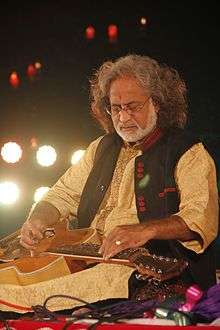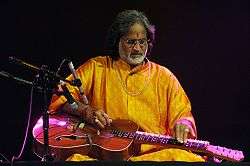Vishwa Mohan Bhatt
Vishwa Mohan Bhatt,[1] also known as V. M. Bhatt (born 27 July 1950), is a Hindustani classical music instrumentalist who plays the Mohan veena (slide guitar).[2][3][4]
Vishwa Mohan Bhatt | |
|---|---|
 Bhatt at Rajarani Music Festival, Bhubaneswar, Odisha | |
| Background information | |
| Also known as | V. M. Bhatt |
| Born | 27 July 1950 |
| Origin | Jaipur, Rajasthan, India |
| Genres | Indian classical music |
| Occupation(s) | Mohan Veena/slide guitar player |
| Instruments | Mohan Veena |
| Years active | 1965–present |
| Website | www |
Personal life
Bhatt lives in Jaipur, Rajasthan, India, with his wife and two sons.[5] His elder son Salil Bhatt is a Mohan veena player (and also a player of the Satvik veena). Bhatt's parents, Manmohan Bhatt and Chandrakala Bhatt were teaching and performing musicians, who imparted knowledge of music to V.M Bhatt.[6] His nephew, Krishna Bhatt, plays the sitar and tabla.

Career
Bhatt is best known for his Grammy award winning album A Meeting by the River with Ry Cooder released on Water Lily Acoustics label. He is also known for other fusion and pan-cultural collaborations with Western artists such as Taj Mahal, Béla Fleck and Jerry Douglas. Exposure such as an appearance on the 2004 Crossroads Guitar Festival, organized by Eric Clapton, allows his playing to reach a larger audience. Guitar duet release with Guitarist Kapil Srivastava (guitarmonk founder)[7] in the year 2016 for the composition "Merry Love Rain."[8] Folk musician Harry Manx, who studied with Salil Bhatt for five years, plays a Mohan veena. Counting Crows' bassist Matt Malley also plays a Mohan veena and is a student and friend of Bhatt. Australian musician Lawrie Minson also learned Mohan veena from Salil. .[9][10]
Select discography
- 1992 - Guitar A La Hindustan, Magnasound (India)
- 1992 - Saradamani, Water Lily Acoustics
- 1993 - Gathering Rain Clouds, Water Lily Acoustics
- 1993 - A Meeting by the River (with Ry Cooder), Water Lily Acoustics
- 1995 - Bourbon & Rosewater (with Jerry Douglas & Edgar Meyer), Water Lily Acoustics
- 1995 - Mumtaz Mahal (with Taj Mahal & N. Ravikiran), Water Lily Acoustics
- 1996 - Saltanah (with Simon Shaheen), Water Lily Acoustics
- 1996 - Tabula Rasā (with Béla Fleck & Jie-Bing Chen), Water Lily Acoustics
- 1996 - Sounds of Strings, Music today, India
- 2002 - Indian Delta (with Sandeep Das), Sense World Music, U.K.
- 2008 - Mohan's Veena, Times Music, India
- 2010 - Desert Slide, Times Music, India
- 2010 - Mohan's Veena II, Times Music, India
- 2011 - Groove Caravan, Deeksha Records, Canada
- 2012- "Morning Mist", Bihaan Music, Kolkatta, India
- 2014 - OMKARA - The Sound of Divine Love (with Rupam Sarmah)[11]
- 2015-"Vishwa Ranjini"-Bihaan Music, Kolkatta, India
Awards
- 1993 Grammy Award (Best World Music Album) – A Meeting by the River(With Ry Cooder)[12]
- Sangeet Natak Akademi Award, 1998[13]
- Padma Shri, 2002[14]
- Padma Bhushan, 2017[15]
References
- "Vishwa Mohan Bhatt performs for a cause - Times of India". The Times of India. Archived from the original on 26 January 2019. Retrieved 26 January 2019.
- "Make the Mohan Veena,but Inform Us". The Indian Express. 6 July 2006. Archived from the original on 18 April 2017. Retrieved 11 April 2015.
- "'String' Operation: Pt Vishwa Mohan Bhatt, father of Mohan Veena". The Indian Express. 7 January 2009. Archived from the original on 17 April 2015. Retrieved 11 April 2015.
- "2018". BBC Music Events. Archived from the original on 26 January 2019. Retrieved 26 January 2019.
- Paachak, Piyush (13 November 2005). "My mother still teaches me music". The Tribune. Chandigarh, India. Archived from the original on 17 July 2009. Retrieved 1 April 2009.
- Ramanath, Renu (18 October 2005). "Reinventing tradition". The Hindu.
- "BroadwayWorld". BroadwayWorld. Archived from the original on 4 June 2016. Retrieved 11 May 2016.
- "DailyNewsOnline". DailyNewsOnline. Archived from the original on 4 May 2016. Retrieved 11 May 2016.
- "Anil Kapoor comes in support of #MeToo movement, calls it fantastic". The Financial Express. 11 October 2018. Retrieved 23 February 2019.
- "Singer Kailash Kher, Grammy winner Vishwa Mohan Bhatt face accusation". The Indian Express. 11 October 2018. Retrieved 5 April 2019.
- "Omkara: The Sound of Divine Love". Omkara - The Sound of Divine Love. Rupam Sarmah. Archived from the original on 2 March 2019.
- "Past Winners Search". Grammy.com. Archived from the original on 14 December 2013. Retrieved 15 December 2013.
- "SNA: Awardees List". Sangeet Natak Akademi. Archived from the original on 17 April 2010. Retrieved 7 August 2009.
- "Year wise list of recipients (1954-2014)" (PDF). Ministry of Home Affairs. Archived from the original (PDF) on 15 November 2016. Retrieved 10 April 2015.
- "Padma Awards 2017 announced". pib.nic.in. Archived from the original on 25 January 2017. Retrieved 25 January 2017.
Further reading
- Hunt, Ken (Oct. 1994) "A straight Bhatt ... the Grammy-winning, Cooder-collaborating inventor of the Mohan Vina" Folk Roots, Oct. 1994; pp. 42–45